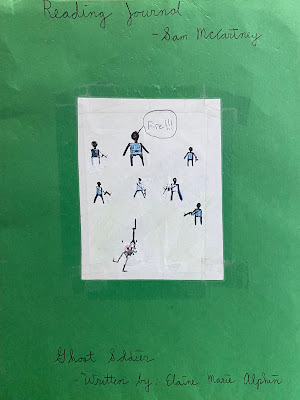In his essay, "Thank You, Esther Forbes," American essayist George Saunders (b 1958) attributes his love of literature to his third grade teacher, Sister Lynette, who suggested that he read Johnny Tremain by Esther Forbes (1891 - 1967).
This childhood classic becomes the dividing line in his life: "Before Johnny Tremain, writers and writing gave me the creeps." But after reading it . . .
" . . . the world, suddenly and for the first time, transformed into something describable, with me, the Potential Describer, at the center.
The world, I started to see, was a different world, depending on what you said about it, and how you said it. By honing the sentences you used to describe the world, you changed the inflection of your mind, which changed your perceptions. . . .
Working with language is a means by which we can identify the bullshit within ourselves (and others). If we learn what a truthful sentence looks like, a little flag goes up at a false one.
. . . But this process takes time, and immersion in prior models of beautiful compression.
Forbes was my first model of beautiful compression. She did for me what one writer can do for antoher: awoke a love for sentences. . . . Reading Johnny Tremain, I felt a premonition that immersion in language would enrich and bring purpose to my life, which has turned out to be true.
So thank you, Esther Forbes . . . that boy made out of words, changed things for me forever" (62 - 64)
It turns out that George Saunders is not the only American talent whose formative years were shaped by Johnny Tremain; there's also Ted Lasso.
Ted: "When I was in fifth or sixth grade, there was this book called Johnny Tremain, and our homework for, like, a month was to read this book. At the end of the month, I hadn't read a lick of it, you know. And we had a test, big test, like, the next day. And the night before, I was anxious as all heck, and I couldn't sleep, and my dad starts getting after me about that. And I start crying. And he's like, "Whoa, buddy. What's wrong? What's wrong?" And I tell him what's up. And he says, "Hey, don't worry about it, okay. Just go up to your room, lay your head on your pillow and think about something you're looking forward to."
So that's what I did. Next morning, I wake up, and he says, "Hey, you ain't gonna ride your bike to school. I'm gonna drive you." And I'm like, "All right." And on the way to school, he talks me through the entire book, like it's a bedtime story or something. Because he stayed up all night, the whole night, reading the whole damn thing, 'cause he didn't want his little boy stressed out over some stupid, silly test. And I ended up getting an A. Boom.
He was a good dad. And I don't think he knew that."From: Season 2, Episode 10:
"No Weddings and a Funeral"
Despite its widespread influence, Johnny Tremain was somehow absent from my own grade school reading program. As for my children, I remember buying them a copy when the title appeared on their summer reading list, but I can't say for sure that they actually read it.
George Saunders' high praise of Esther Forbes inspired me to correct the oversight at long last. When I went to find Johnny Tremain on our Adolescent Lit Shelf, I pulled down a couple of others as well, that I remember my son Sam reading and reporting on the 6th grade:
both by Elaine Marie Alphin (1955 - 2014) Thanks Elaine, and Rest in Peace.
We were honored to meet you at the
Happy Hollow Middle School Book Fair.
How we wish you had not died young.
Alphin, like Forbes, wrote novels of American history but with the added component of apparitions and time travel -- always a plus! It's worth taking a moment to look back in time at the conflicts faced by Apprentice Jonathan Lyte Tremain, Cadet Wm. Hugh McDowell, and Private Richeson Francis Chamblee, three earnest protagonists whose stories are fun and mind - expanding, requiring Patriots to be understanding of Loyalists, and Yankees to be tolerant of Confederates.
Another young American hero that Saunders cannot speak too highly of is Huckelberry Finn:
"Huck and Tom represent two viable models of the American Character. They exist side by side in every American and every American action. America is, and always has been, undecided about whether it will be the United States of Tom or the United States of Huck.
The United States of Tom looks at misery and says: Hey, I didn’t do it. It looks at inequity and says: All my life I have busted my butt to get where I am, so don’t come crying to me. Tom likes kings, codified nobility, unquestioned privelege. Huck likes people, fair play, spreading the truck around. Whereas Tom knows, Huck wonders. Whereas Huck hopes, Tom presumes. Whereas Huck cares, Tom denies. These two parts of the American Psyche have been at war since the beginning of the nation, and come to think of it, these two parts of the World Psyche have been at war since the beginning of the world, and the hope of the nation and of the world is to embrace the Huck part and send the Tom part back up the river, where it belongs." (203 - 04)
Both essays --
"Thank You, Esther Forbes" &
"The United States of Huck" --
can be found in The Braindead Megaphone:
Essays by George Saunders (2007)
Previously
"Tolstoy thought well of you
– he believed that his own notions
about life here on earth would be
discernible to you, and would move you.
"Tolstoy imagined you generously,
you rose to the occasion."
~ George Saunders ~



